Universal Noir #1 from Indicator
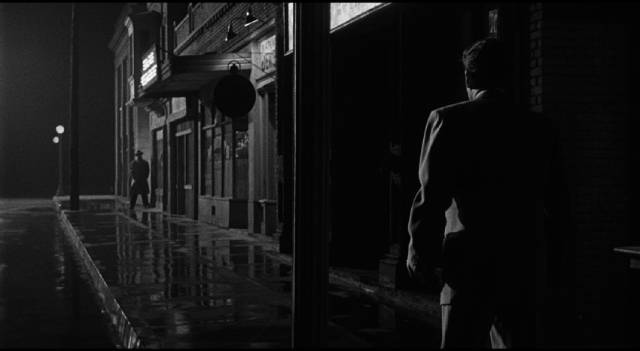
After five sets of films noirs produced by Columbia between the mid-’40s and late ’50s, Indicator have switched tracks and released volume one of a similar line devoted to movies produced by Universal during the same period. Universal Noir #1 is a strong start, with six features plus Indicator’s usual plentiful extras to provide context.
It’s too early to make any conclusive judgments about possible differences between the two studios’ approach to the genre, but I do have a couple of impressions: casts are generally excellent, with some fairly big names which raise several of the films above mere B-movie level; in several cases the movies end on a brighter note than usual for noir, with the air of doom dispelled by a suggestion of redemption; and related to this, troubled men are saved rather than destroyed by the women they become involved with, nudging stories towards melodrama rather than full-on noir.
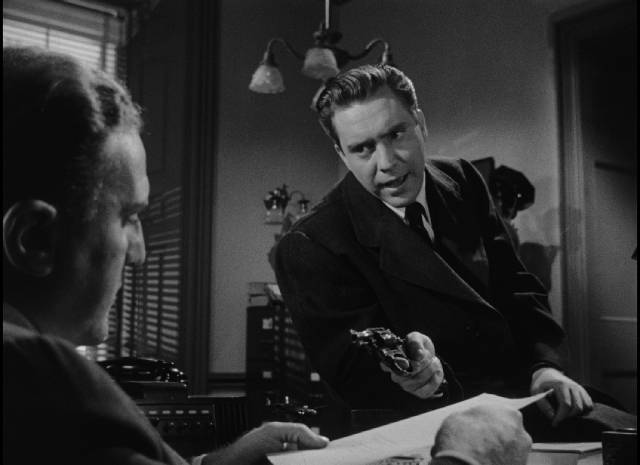
The Web (Michael Gordon, 1947)
The big surprise about The Web (1947) is that it was an early directorial effort by Michael Gordon, best known to me for the Doris Day romantic comedies Pillow Talk (1959) and Move Over, Darling (1963). The Web is a taut little thriller in which a brash but naive attorney finds himself enmeshed in the murder scheme of a slick businessman. Bob Regan (Edmond O’Brien) forces his way into the office of Andrew Colby (Vincent Price) seeking restitution for his client whose fruit cart was wrecked by Colby’s careless driving. Colby, a man used to dealing with vast sums of money, is amused that so much energy is being expended over what amounts to pocket change for him.
Inviting Regan to his mansion that evening, he offers Bob $5000 to serve as his bodyguard for a while because his life has been threatened. Although the job is totally outside his experience, Regan is tempted because the money will enable him to set up his own office. He’s also swayed by Colby’s attractive private secretary Noel Faraday (Ella Raines). The job stems from the recent release from prison of Colby’s former partner Leopold Kroner (Fritz Leiber), who was put away for five years for forging some bearer bonds.
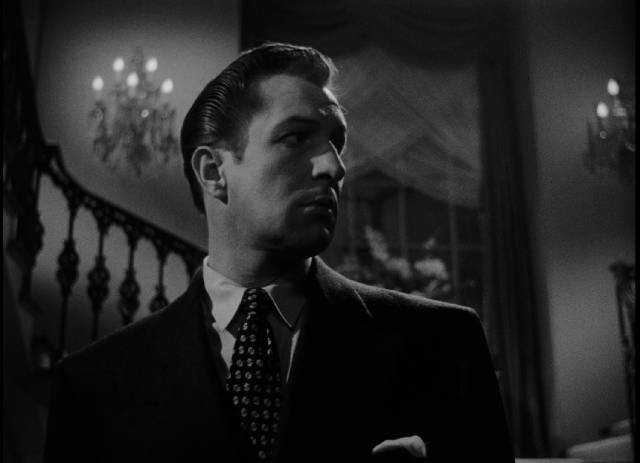
Given a handgun by Colby, Regan heads for the police station where he asks old friend Lieutenant Damico (William Bendix) to rush a firearm permit. Damico is suspicious, but finally acquiesces. That night, while Regan chats with Noel, a shot is fired upstairs and he rushes to Colby’s office, sees Kroner turning towards him with a gun in his hand, and fires a couple of fatal shots.
Regan is in a sticky position as he begins to suspect that he has been manipulated by Colby into killing Kroner. If it was a set-up, then Regan is guilty of murder; if it was truly self-defence, then he’s in the clear. With Damico breathing down his neck, he sets out to untangle events with Noel’s help. Colby is smarter than him and much more cool-headed, so the more Regan digs the worse things look for him … and for Noel, as her boss engineers another murder and builds a frame to trap both her and Regan. The attorney remains gullible and it’s ultimately Damico, the cynical cop, who manages to sort things out.
The three male leads do an excellent job playing off each other as Colby spins his web, while Raines occupies an ill-defined position – neither femme fatale nor active heroine – her role merely to be an attractive object complicating the connection between Regan and Colby.
*
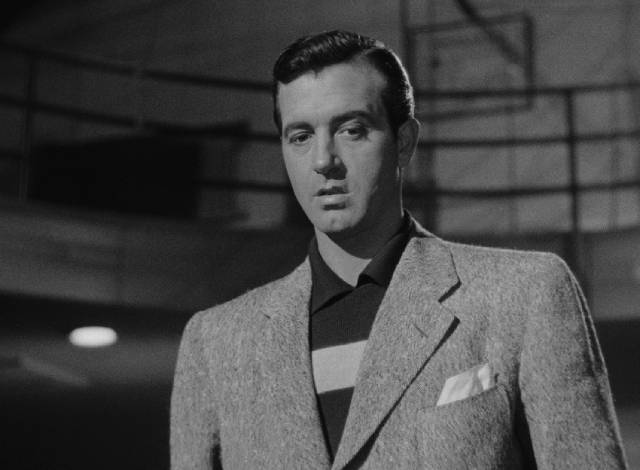
Larceny (George Sherman, 1948)
Instead of a sucker drawn into a nefarious plot, George Sherman’s Larceny (1948) focuses on a member of a criminal gang who struggles with his conscience. Rick Maxon (John Payne) works with a team of con-men led by Silky Randall (Dan Duryea) who use elaborate real estate scams to get large sums out of rich people who are willing to take the loss in order to avoid scandal. Having just wrapped up a job involving the proposed building of an exclusive yacht club, they move West with their next scheme.
Rick is to pose as the old army buddy of a fallen hero named Clark, with the idea of raising money for a memorial in the dead man’s name. The plan involves him working on Clark’s grieving widow Deborah (Joan Caulfield) and her father (Walter Greaza). Needless to say, he begins to fall for Deborah and feels pangs of conscience, particularly after he inspires her to invest her own money in a plan for a boys’ home in her husband’s name, instead of raising the money through donations from the town’s wealthy citizens.
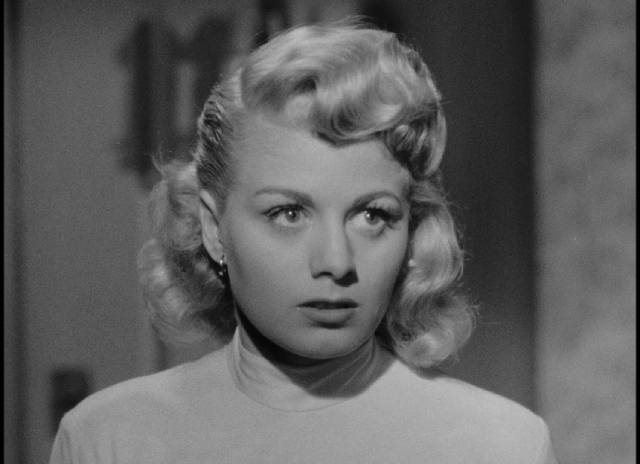
To complicate matters, Rick has gotten himself tangled up with Silky’s girl, Tory (Shelley Winters), who lacks any sense of caution. She follows Rick to the town and doesn’t make much effort to conceal their relationship, despite Silky being violently jealous. Caught between sweet and innocent Deborah and femme fatale Tory, Rick tries to abort the con, but Silky has no intention of letting the money slip through his grasp.
Payne plays Rick as a nice guy who’s got himself into a bad situation, while Duryea is at his nasty best in the kind of role he made his signature in numerous movies. Caulfield and Winters are effective in what amount to overly emphatic opposites, while the rest of the cast provide solid support – Dan O’Herlihy and Richard Rober as the other gang members; Nicholas Joy as previous victim Walter Vanderline, who shows up in town at an inconvenient moment; Percy Helton as the man who currently offers support to the town’s wayward boys.
Things get pretty complicated on the way to Rick finally owning up to his responsibilities and doing the right thing. While the script works things out in a satisfying way, this is the least stylish film in the set, with Sherman’s direction little more than functional and Irving Glassman’s cinematography rather flat, adding little atmosphere to the story.
*
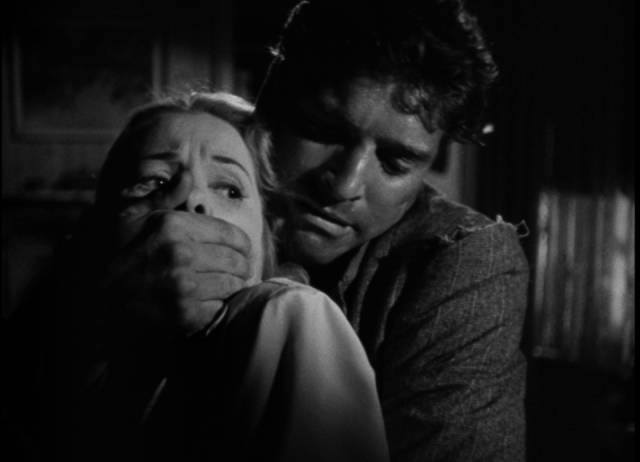
Kiss the Blood Off My Hands (Norman Foster, 1948)
Norman Foster’s Kiss the Blood Off My Hands (1948) takes the prize for most evocative title, while the script provides a less typical setting (London shortly after the war) and a narrative which reverses noir expectations. Rather than a hapless hero ruined by a femme fatale, we get a damaged and violent man redeemed by a good woman.
Burt Lancaster’s Bill Saunders is not a sympathetic character. In the opening sequence, he’s slumped at the bar of a pub at closing time; when the landlord tells him he’s got to go, he lashes out, punching the man, who falls and cracks his head. A momentary flash of anger has made Bill a murderer, and he runs out into the wet street, pursued by witnesses who are quickly joined by coppers. Scrambling up some scaffolding, Bill manages to jump across to a window, which turns out to be the room of Jane Wharton (Joan Fontaine).
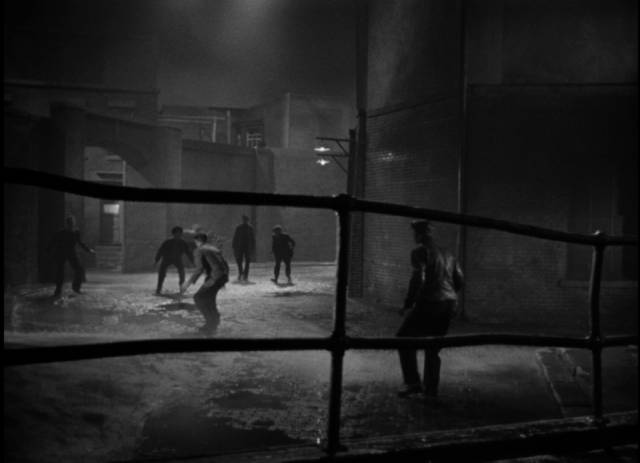
Jane is a nurse, herself suffering from the effects of the war, specifically the death of her fiance. She isn’t afraid of Bill, but treats his intrusion matter-of-factly, leaving for work in the morning after telling him she expects him to be gone when she returns. He does leave, but finds himself drawn back to her repeatedly. She eventually gets him a job as a driver for the hospital where she works and he seems to become stable – until black-marketeer Harry Carter (Robert Newton), who witnessed what happened that night in the pub, shows up to blackmail him into helping to hijack a van-load of medical supplies.
Bill struggles with his demons and his conscience, but the tempering influence of Jane gradually eases the anger resulting from two years of abuse in a German prison camp, and he finally faces up to his own actions with her help.
Former actor Foster gets strong performances from the cast and, with veteran cinematographer Russell Metty behind the camera, gives the story a dense atmosphere on a beautifully designed maze of narrow streets built at Universal Studios, mostly shot at night. This is the most stylish movie in the set, with its noir trappings reaching a feverish intensity even though in the final moments it pulls back from doomed romance to hint at the possibility of redemption.
*
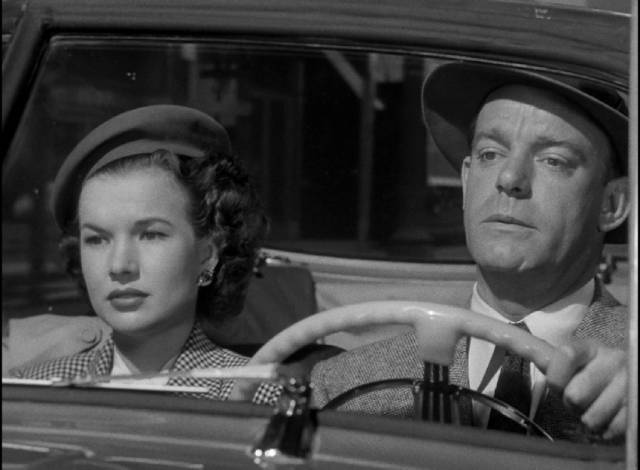
Abandoned (Joseph M. Newman, 1949)
Joseph M. Newman’s Abandoned (1949) leans more towards a social issues drama than noir, though it’s populated with familiar genre faces – Dennis O’Keefe, Gale Storm, Jeff Chandler, Raymond Burr – and much of it takes place at night on the streets of Los Angeles. Paula Considine (Storm) arrives at city hall to report her sister missing, but the cops don’t seem particularly interested. Reporter Mark Sitko (O’Keefe) overhears and butts in, though she’s wary of his interest because she doesn’t want any publicity. Nonetheless, she agrees to visit the morgue with him and there they find the sister, a Jane Doe who apparently committed suicide via car exhaust.
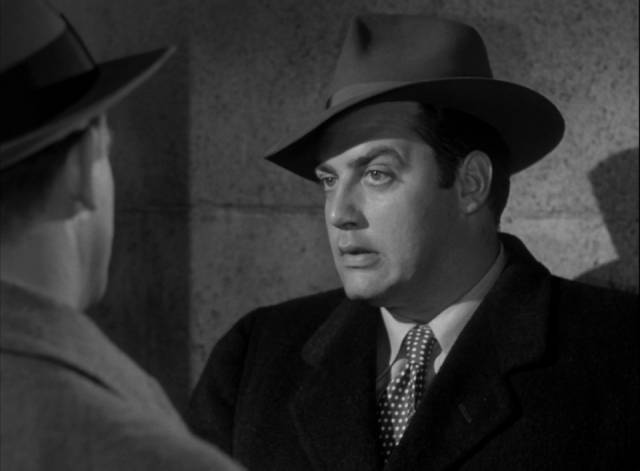
As they leave the morgue, Sitko notices that they’re being followed by sleazy private eye Kerric (Burr). Digging into the case, Sitko learns that the unmarried sister had disappeared just as she was due to give birth to an illegitimate baby. With the help of police chief McRae (Chandler), they gradually uncover an unsavoury operation which takes advantage of “girls in trouble” and sells their babies to wealthy people. Paula’s sister had apparently changed her mind at the last moment and had been disposed of by the gang.
With the help of another pregnant woman, Dottie Jensen (Meg Randall), who had befriended Paula’s sister, McRae sets up a sting to expose the gang, led by cold-blooded Mrs. Donner (Marjorie Rambeau). Utterly ruthless, the gang come close to killing Paula and her sister’s baby before a violent climax leads to an upbeat conclusion. Abandoned is closer to the post-war documentary style crime movie than true noir and touches on issues which are surprising considering the restrictive production code; while the characters face dire consequences, the script doesn’t seem at all censorious about unwed mothers … in fact, it’s society’s attitudes which make these women vulnerable to the predatory gang.
*
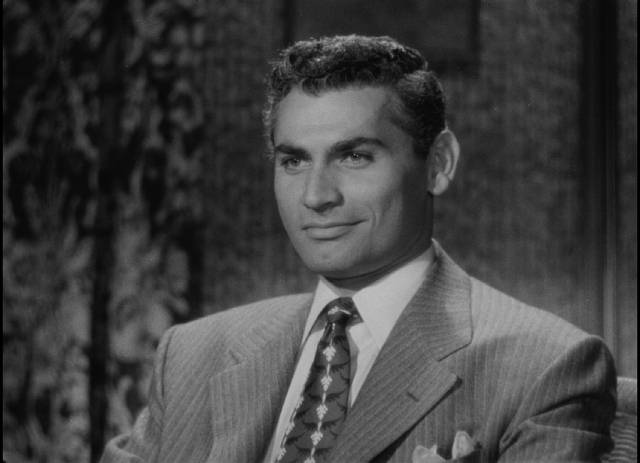
Deported (Robert Siodmak, 1950)
Robert Siodmak was no stranger to film noir, having made a number of classics in the ’40s – Phantom Lady, The Killers, Criss Cross among others – but he was close to the end of his Hollywood career when he made Deported in 1950, a sometimes awkward mix of genres. A couple of years later, he returned to Germany, which he had left after the Nazis rose to power in 1933, first going to France, where he made almost a dozen features before heading for the U.S. when the war began in Europe.
As one of the filmmakers who made People On Sunday in 1930, Siodmak had pioneered what would emerge after the war as neorealism and he returned to that documentary-inflected style with Deported, much of which was shot on location in Italy (in Naples, Siena and Tuscany), with additional work completed on the Universal lot, largely because lead Jeff Chandler had to get back to the States due to commitments on the Our Miss Brooks radio show.
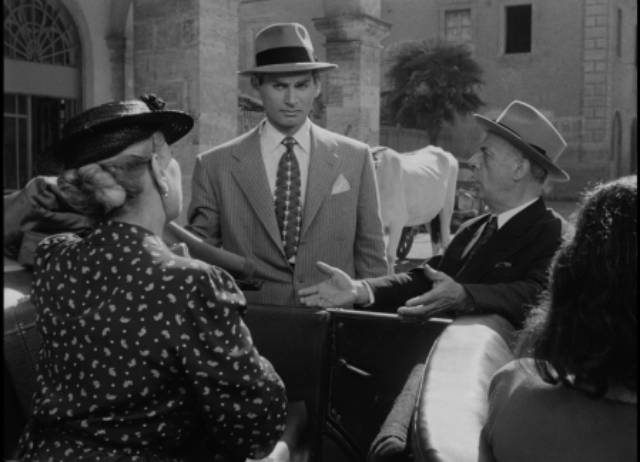
Made shortly after the deportation of Lucky Luciano, the story focuses on immigrant criminal Vic Smith (Jeff Chandler again), sent back to Italy after five years in prison for a big robbery. He’s bitter and angry and chafes at what’s being forced on him by the American authorities and the Italian police, the latter represented by Vito Bucelli (Claude Dauphin), who expects nothing but the worst from Vic. On arrival in Naples, Vic is ordered back to his family’s home town in Tuscany, where he’s greeted as some kind of hero by uncle Armando Sparducci (Silvio Minciotti) and his family and neighbours, who believe he’s a representative of the U.S. government on a confidential mission – a misunderstanding Vic does nothing to dispel.
Attracted by a sultry woman named Gina (Marina Berti), Vic is lured to a meeting with his old associate Bernardo (Richard Rober), who has followed him to Italy looking for his cut of the $100,000 from the robbery; since Vic took the fall and went to prison, he doesn’t feel inclined to share, so you know there’ll eventually be trouble. But in the meantime, Vic has been making moves on Countess Christine di Lorenzi (Märta Torén), still grieving for her husband who died in the war. He starts taking part in her local charity work, gaining a reputation among the locals, though we know that he has ulterior motives.
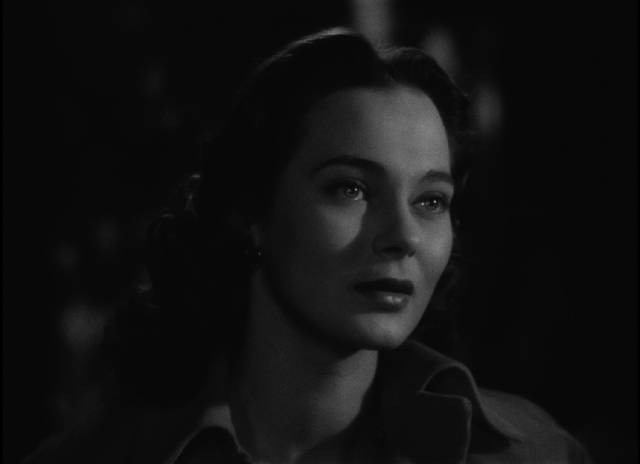
Those motives become clear when he hooks up with local black-marketeer Guido Caruso (Carlo Rizzo); in order to get his loot out of the U.S. Vic comes up with a scheme to buy $100,000 in food and supplies for the town, which is struggling with the post-war collapsed economy. Once the goods have arrived, Guido’s men will steal everything and sell it on the black market, splitting the proceeds with Vic. But inevitably, Vic’s feelings for Christine have become genuine and when she reveals at the community celebration that it was Vic who paid for all the supplies, he tries to abort the theft, tangling with Guido and Bernardo as Vito closes in.
Siodmak and writer Robert Buckner never quite find a viable balance between the different elements – the crime story, the romance and the neorealist depiction of Italy still struggling a few years after the end of the war. The romance is probably the weakest part, with not much chemistry between Chandler and Swedish actress Torén, who remains rather pale and passive throughout. Vic’s criminal scheme and his conflict with Bernardo are well-enough worked out, but the movie’s main interest is the location shooting in Italy with a largely local cast; it’s intriguing to see a Hollywood studio production dabbling in neorealism, but lacking the confidence not to graft on genre tropes to make the documentary elements more conventional.
*
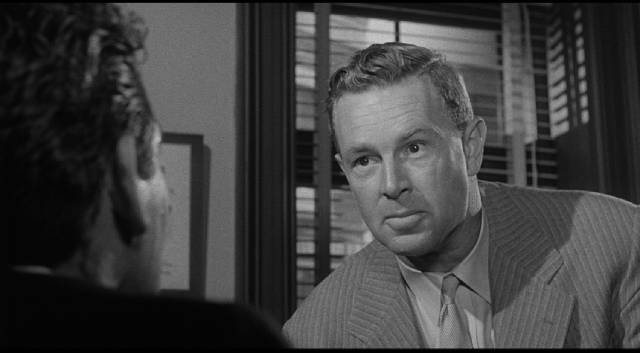
Naked Alibi (Jerry Hopper, 1954)
Jerry Hopper had a ten-year career in B-movies before turning almost exclusively to television in the late-’50s. Nothing much stands out in more than a dozen features he made in the six years following his theatrical debut, a pretty good cold war thriller called The Atomic City (1952), but Naked Alibi (1954) seems a cut above the rest. With an excellent cast and a grim script by Lawrence Roman, along with Kiss the Blood Off My Hands it’s the closest to classic noir in the set.
Having been picked up after a drunken fight, Al Willis (Gene Barry) is aggressively uncooperative with the cops, even attacking Detective Fred Parks (Max Showalter) during questioning. He’s nonetheless released and offers an apology. Soon after, Parks is gunned down in the street and Detective Joseph Conroy (Sterling Hayden) immediately suspects Willis. But there’s no evidence and Willis appears to be a solid citizen, a family man with wife and daughter, who runs a successful bakery. When two more cops are killed by a car bomb, Conroy becomes even more certain that Willis is the killer.
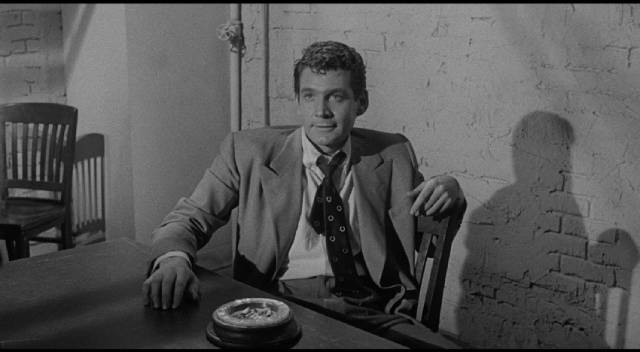
Conroy hounds him mercilessly, going so far over the line that he eventually gets kicked off the force. Willis tells his wife Helen (Marcia Henderson) that he needs to get away for a while to escape Conroy’s persecution. He heads for a small border town where it quickly becomes apparent that the whole family man identity is merely a cover for his activities as the leader of a smuggling operation. He also hooks up again with Marianna (Gloria Grahame), his former girlfriend who scrapes by singing in a seedy bar. He’s physically and psychologically abusive, but she doesn’t mind – life’s been tough and she’s used to it.
Conroy tracks Willis to the border, but is waylaid by a gang who rob him and leave him for dead in an alley. Found by young Petey (Night of the Hunter’s Billy Chapin), he’s nursed back to health by Marianna. But Conroy isn’t much of an alternative to Willis; although he was a cop, he also has an almost uncontrollable temper and a penchant for violence. He’s a “good guy” only because he channels those tendencies into stopping a sociopath; but he stands outside all society’s rules to accomplish that goal.
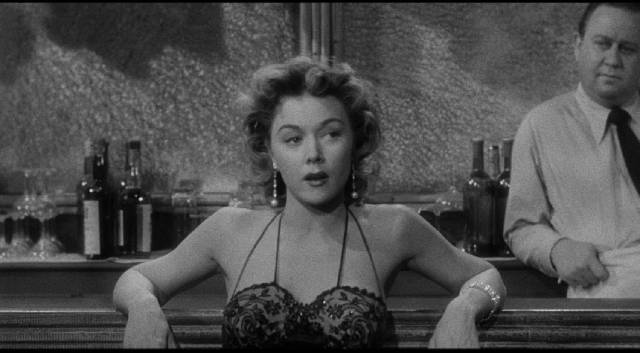
With Marianna’s help, Conroy heads back to his hometown to uncover crucial evidence of Willis’s guilt, but now he’s a fugitive himself, more of a pariah than his quarry because of his status as a former cop gone rogue. The threads come together in a violent climax – but while Conroy is ultimately vindicated it’s at a high cost.
Even as an ostensible hero, Hayden embodies menace, always on the edge of violence; it’s only Marianna’s history of abuse and defeat which makes Conroy seem like a way to escape the hold Willis has over her. Grahame is at her best here, suggesting a world-weary inner strength no matter how badly life has treated her – she doesn’t have the cool ambiguity of a femme fatale, but her vulnerability never comes across as weakness. She’s a woman doing what she can to stay afloat in a world dominated by toxic masculinity.
Barry, previously the likeable hero of Byron Haskin’s The War of the Worlds (1953) and later the suave head of the LAPD homicide division in Burke’s Law (1963-66), is here irredeemably vicious as Willis, a kind of younger brother to Richard Widmark’s Tommy Udo in Henry Hathaway’s Kiss of Death (1947).
*
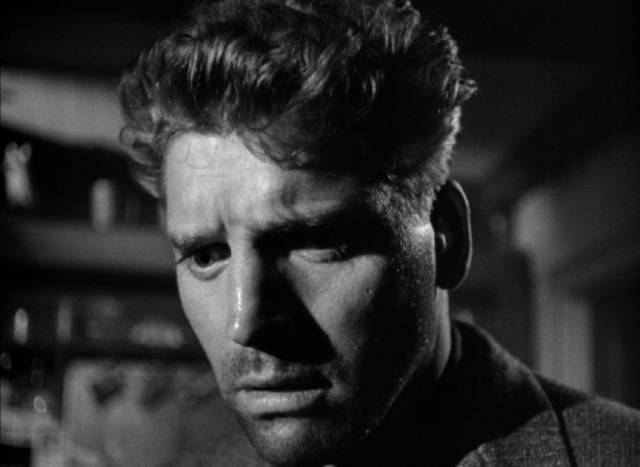
As usual, Indicator’s six-disk set is exemplary, with excellent transfers which show occasional minor damage in the source materials but have strong contrast, deep blacks, and a touch of grain to provide a film-like texture. Each movie gets a commentary track from an expert, plus a featurette or two and a contemporary short film which illuminates related themes – most interestingly, a pro-union documentary about a successful strike against GM in the late-’30s; most disconcertingly, a very graphic army training film about VD which focuses on Black soldiers and expresses a disturbing degree of misogyny (all women are filthy and disgusting and must be avoided at all costs).
Let’s hope Indicator is tapping into another rich vein here and will produce additional volumes to match the previous Columbia Noir sets.
Comments
Tried to find Universal Noir #1 on Amazon. Many individual films and several other noir collections come up, but not that one.
Probably because it’s a region B release from the UK … it may take a while for sellers to start listing it on Amazon in the States and Canada. I always buy Indicator titles directly from the Powerhouse Films website, but they’re also usually listed on Diabolik in the U.S.